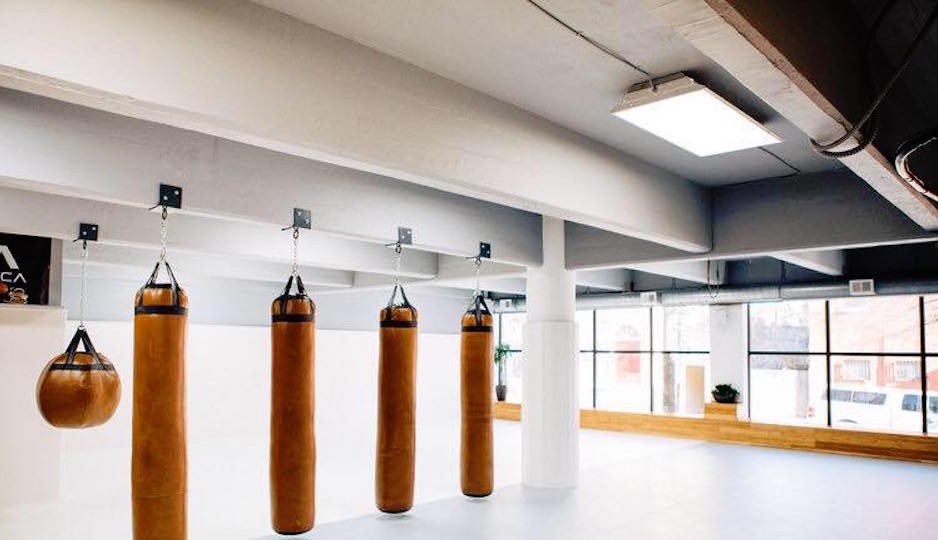10 Things to Know Before Your First Martial Arts Class, According to the Pros

Roots Athletics | Photo via Facebook
The typical gym routine — running on a treadmill followed by lifting heavy objects — can get pretty monotonous. If you’re looking for a new way to spice up your workouts, why not try throwing some rear-naked chokes and roundhouse kicks into the mix? Martial arts classes are a great way to not only get in shape, but learn how to whoop a butt or two in the process.
To help newcomers to the scene better understand what they’re getting into, we asked seasoned martial artists Phil Migliarese, owner of Balance Studios, and Levi LaLonde, owner of Roots Athletics, what new students should know before heading to their first martial arts class. See what they had to say below.
1. You will work really hard — which means lots of calories burned.
When you first start with martial arts, the body is working in ways it hasn’t had to in the past, providing an overall boost to your strength, cardio and dexterity. According to Levi, “A lot of cats don’t even realize how much they’ve been working and that they’re getting an 1,100, 1,200 or even 1,500 calorie-burning workout in the hour.” Taking in all the details and techniques you’re learning can distract your mind from how hard you’re actually pushing your body.
2. Martial arts is for everyone, big or small.
Despite what you may think, not everyone who takes martial arts is a blood-thirsty behemoth. In fact, there is typically a huge diversity of students. Whether you’re six feet tall or you’re shorter then the average fifth grader, self-defense is accessible to anyone.
3. You need to do your homework before going.
There are a ton of martial arts schools with a variety of classes to choose from, like Jiu-Jitsu, Muay Thai, Capoeira and MMA to name a few. So what’s one of the best things to do to prepare before taking a class? “Homework!” Levi says. “I really think it’s important for people to research where they are going and what type of martial art they are doing.” Many studios have membership programs for those who want to perfect their craft. Other schools may offer drop-in class rates for students who just want to add a martial arts class to their existing workout schedule and learn a few techniques. Even something as simple as the aesthetic appeal of a gym can make for a better experience. Picking the right studio and program is crucial for starting your martial arts studies off on the right foot, so do your research.
4. It’s important to go in with an open mind.
In order to gain the full experience of a class, you should leave all of your preconceptions behind. This includes but is not limited to thinking martial arts is “just a bunch of rolling around with sweaty dudes!” As Levi says, “Open up, take the blinders off, relax and enjoy the class. Learn what that instructor has to teach you. That one technique you learn that day may help you in the time you actually need it.”
5. You will get a kick-ass workout while learning how to kick ass.
I think it goes without saying, but martial arts classes will give you a serious advantage come a street brawl. Levi points out that there is a chance you’ll get into a physical altercation at least once in your life, so it’s only smart you know how defend yourself in case someone breaks out the fisticuffs. “Martial arts is a self-defense sport first and foremost,” Levi says.
6. You will get a bump or a bruise every now and then.
While the classes are very safe, accidents do happen. I’m not saying you’ll leave the studio looking like a month-old banana, but this is a contact sport, so don’t be surprised if you hit your funny bone once or twice. “The whole point of martial arts is to avoid the things that give you bumps and bruises,” says Phil. “So the better you get, the less that will happen.”
7. You’ll get more out of it than just sore shoulders.
Having a tough time handling stress? Do you have a hard time controlling your breath during a tough workout? These are just a few of the issues you can expect to tackle in a martial arts class. As Levi says, “Your ability to handle stress, pressure and pain and to make a clear, conscious and positive decision will be lightyears ahead” after learning martial arts. In other words, you can expect to learn some unexpected lessons during class.
8. There’s no slacking in martial arts.
To fully experience martial arts, attending a class every couple weeks won’t cut it. Studying the art takes time, and practice is crucial if you want to see real results. “It’s really important for people to understand that martial arts is a lifestyle and not a hobby,” says Levi. “You are learning new lessons and are tested every day. Consistency is really big.” Phil has the same thoughts: “You’re missing out if you only pop in once every few months. You have to look for a quality school and look to be a quality student,” he says.
9. You’ve got to gear up.
Just like in most sports, the right equipment is essential for protecting yourself and others. Martial arts is no different, but the amount of equipment needed differs depending on the class. A mouthpiece and a groin protector are both key across any martial arts class, and studios often sell these themselves. Other equipment is class specific. For example, Muay Thai requires boxing gloves (usually 20-ounce gloves) and shin pads, because shin-to-shin contact feels like death itself has come to take your leg. Jiu-Jitsu requires a gi (think Daniel’s kimono from the Karate Kid). It’s worth checking in with the studio you plan on popping into to see exactly what you should come with.
10. Expect to become a part of a community, not just a gym.
Without a doubt, the most important aspect of martial arts is the sense of community that develops within the gym. The comradery between students and the instructors is key. “Things in the martial arts are tough sometimes and you need people around you to push you,” explains Phil. “When you have someone you trust with your arm and your neck, it tends to go a long way.” On that note, I’d suggest not pissing off your training partner.
Like what you’re reading? Stay in touch with Be Well Philly — here’s how:
- Like Be Well Philly on Facebook
- Follow Be Well Philly on Twitter
- Follow Be Well Philly on Pinterest
- Get the Be Well Philly Newsletter


